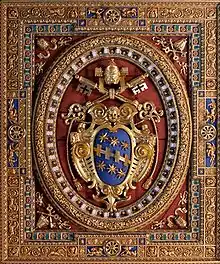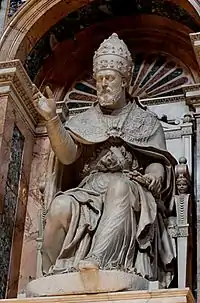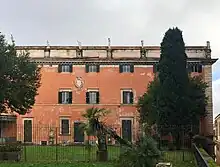

The Aldobrandini Collection was an art collection begun at the end of the 16th century by the Aldobrandini family.
First formed after a notable bequest of works from the d'Este collection in Ferrara, it became one of the first art collections to kick-start the boom in art patronage in 17th century Rome. Its collecting activities all centred upon Pietro Aldobrandini, made a cardinal by his uncle Pope Clement VIII.
The collection was relatively short-lived, only lasting a century and split up when the family's direct male line died out. Its last owner was Olimpia Aldobrandini, who in 1682 left it to the children from her first and second marriages, thus dividing the collection between those of the Borghese and Pamphilj families.[1]
History
17th century
Acquisitions from the d'Este collection
In 1598, during Clement VIII's pontificate, Ferrara was devolved to the Papal States, meaning the d'Este court moved to Modena. The famous camerini d'alabastro[2] of Alfonso I d'Este were therefore dismantled, with the works stealthily requisitioned by cardinal Pietro Aldobrandini, papal legate - on this occasion he acquired the four bacchanal scenes (one being Bellini's The Feast of the Gods and the rest Titian's Bacchus and Ariadne, The Bacchanal of the Andrians and The Worship of Venus.[3]
Soon afterwards, for unclear reasons, Pietro was also left works in Lucrezia d'Este's will, to which he added works from his own collection by 16th century painters from Ferrara and Venice such as Garofalo, Ludovico Mazzolino, Scarsellino and Ortolano. With this nucleus of paintings, all immediately taken to Rome (whereas works commissioned by the d'Este family for churches were left in place), the Aldobrandini became major patrons of the arts and - with the Borghese and Giustiniani collections also starting around this time - the 17th century boom in art collecting in Rome began.
Move to Rome and construction of the family residences

Orders of cardinal Pietro Aldobrandini
Under Olimpia Aldobrandini
Olimpia Aldobrandini's bequest to her children (1682)
18th-20th centuries
Selected works
Archaeology
Paintings
Family tree of the collection's inheritors
References
Bibliography
- (in Italian) Galleria Borghese, in Guide ai musei, Roma, Touring Editore, 2000, ISBN 88-365-2113-4.
- (in Italian) A.G. De Marchi, Collezione Doria Pamphilj, Catalogo generale dei dipinti, Roma, Silvana Editoriale, 2016, ISBN 978-88-366-3296-1.
- (in Italian) Francis Haskell and Tomaso Montanari, Mecenati e pittori. L'arte e la società italiana nell'epoca barocca, Einaudi, Torino, 2019, ISBN 978-88-062-4215-2.
